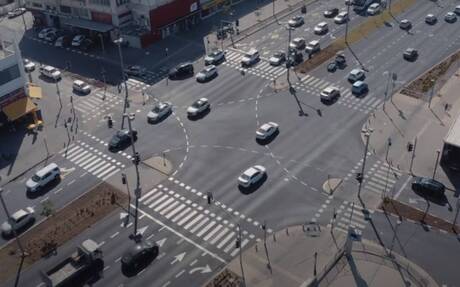Google Aims to Cut Traffic, Emissions With AI-Enhanced Traffic Lights
Google’s artificial intelligence can now calculate the most fuel-efficient route when you enter a destination in Google Maps, but the tech giant wants to go much further by optimizing traffic lights.
Since pollution at city intersections can be 29 times higher than on open roads, and about half the emissions at those intersections come from traffic stopping and starting, Google launched a new initiative called Green Light with the hope that cities around the world will use its technology.
- Also: Toronto Among 10 Worst Cities for Traffic in 2022
- Also: Study: Expanding Highways Doesn’t Fix Traffic Congestion
How does it work? The company explained it uses AI and Google Maps driving trends to model traffic patterns and make recommendations for optimizing the existing traffic light plans. City engineers can implement these in as little as five minutes, using existing infrastructure.
By optimizing not just one intersection, but coordinating across several adjacent intersections to create waves of green lights, cities can improve traffic flow and further reduce stop-and-go emissions.
Google this week announced that the early numbers indicate a potential for up to 30 percent reduction in stops and up to 10 percent reduction in emissions at intersections. Green Light is now live at 70 intersections in 12 cities from Seattle to Jakarta. At intersections where Green Light is already live, this can save fuel and lower emissions for up to 30 million car rides monthly.
Green Light is capable of analyzing thousands of intersections simultaneously, improving the flow through multiple intersections in the city. Google’s AI-based recommendations work with existing infrastructure and traffic systems. Naturally, as the project expands, additional data will be available to increase precision and further optimize traffic light management.
A few cities in Canada could sure use the tech. According to the 2022 Global Traffic Scorecard by INRIX, Toronto landed in the 7th spot with 118 hours lost in traffic on average—a dramatic increase of 59 percent from 2021, yet down 13 percent from pre-pandemic levels of 2019.
The next closest Canadian city is Montreal, which ranked 33rd with 72 hours lost in traffic, up 38 percent from the previous year. It is followed by Vancouver (58th, 59 hours), Winnipeg (107th, 48 hours), Calgary (460th, 20 hours) and Edmonton (834th, 7 hours).
